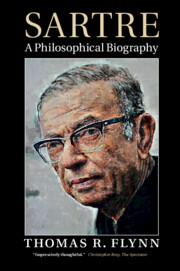Book contents
- Frontmatter
- Dedication
- Contents
- Preface
- Acknowledgments
- Abbreviations
- 1 The childhood of a genius
- 2 An elite education: student, author, soldier, teacher
- 3 Teaching in the lycée, 1931–1939
- 4 First triumph: The Imagination
- 5 Consciousness as imagination
- 6 The necessity of contingency: Nausea
- 7 The war years, 1939–1944
- 8 Bad faith in human life: Being and Nothingness
- 9 Existentialism: the fruit of liberation
- 10 Ends and means: existential ethics
- 11 Means and ends: political existentialism
- 12 A theory of history: Search for a Method
- 13 Individuals and groups: Critique of Dialectical Reason
- 14 A second ethics?
- 15 Existential biography: Flaubert and others
- Conclusion: the Sartrean imaginary, chastened but indomitable
- Select bibliography
- Index
- References
11 - Means and ends: political existentialism
Published online by Cambridge University Press: 18 December 2014
- Frontmatter
- Dedication
- Contents
- Preface
- Acknowledgments
- Abbreviations
- 1 The childhood of a genius
- 2 An elite education: student, author, soldier, teacher
- 3 Teaching in the lycée, 1931–1939
- 4 First triumph: The Imagination
- 5 Consciousness as imagination
- 6 The necessity of contingency: Nausea
- 7 The war years, 1939–1944
- 8 Bad faith in human life: Being and Nothingness
- 9 Existentialism: the fruit of liberation
- 10 Ends and means: existential ethics
- 11 Means and ends: political existentialism
- 12 A theory of history: Search for a Method
- 13 Individuals and groups: Critique of Dialectical Reason
- 14 A second ethics?
- 15 Existential biography: Flaubert and others
- Conclusion: the Sartrean imaginary, chastened but indomitable
- Select bibliography
- Index
- References
Summary
In this chapter we return to the texts that form the common source for the ethical and political streams mentioned in the previous chapter. But now our intent is to review some of the same institutions, structures and events from the perspective of Sartre’s developing political theory and practice. Perforce, such a move will entail some repetition – a certain “rerun” of the film for the sake of a perspective politically enriched much as Heidegger famously ventured when he undertook a Wiederholung (repetition) of the first portion of Being and Time under the aspect of “temporality” in the second. The political significance rather eclipsed in the previous chapter should now achieve full view. As a student in the lycée, the young Sartre did not display a serious interest in political theory or in practical politics generally. His natural tendencies were anarchic. Toward the end of his years at the ENS, however, he did publish an informed essay on contemporary French legal theories “The Theory of State in Modern French Thought” (1927). It was in the fall of that year that his close friend Paul Nizan joined the French Communist Party (PCF). Nizan would later spend an idealistic year in the USSR and return to lecture Sartre, Beauvoir and their mutual friends on the promise of the Soviet Revolution. Sartre’s interests, at that time, were more literary and philosophical than political. He resisted the siren call of socialism, for example, that had turned the heads of many of his classmates at the École, including Raymond Aron. Eschewing party adherence, Sartre nonetheless was strongly opposed to colonialism, which he regarded as a sordid form of state takeover. The young Sartre harbored a basic egalitarian spirit from his early teens and, as he recalled, thought of the French control of Algeria whenever the injustice of colonialism came to mind (Cér 478). As his life-long companion Simone de Beauvoir remarks, they showed little concern for politics after graduation and did not even vote in the critical general election of 1936 that ushered in the socialist program of the Front Populaire. But even in those years his tendencies veered toward the Left.
- Type
- Chapter
- Information
- SartreA Philosophical Biography, pp. 283 - 313Publisher: Cambridge University PressPrint publication year: 2014



